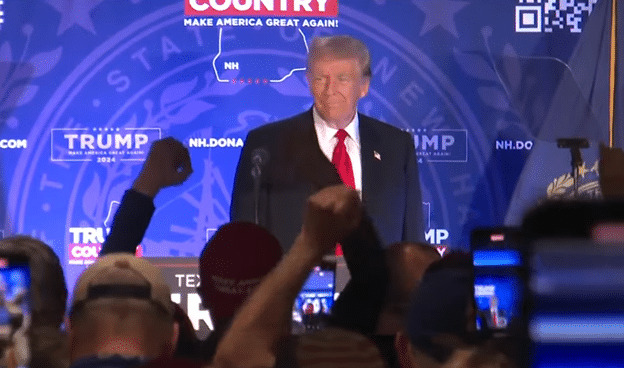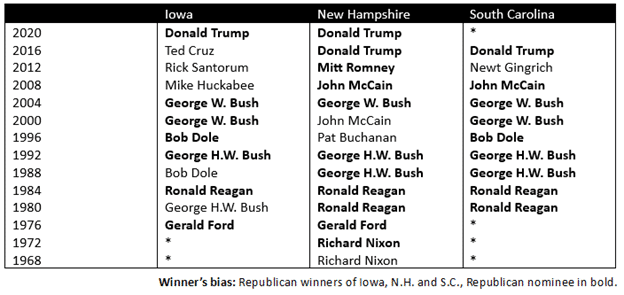January 18, 2024
Permission to republish original opeds and cartoons granted.
Could Trump sweep the primaries?

By Robert Romano
After a record-setting near 30-point win in the Iowa caucus, former President Donald Trump has headed to New Hampshire to do what no candidate in a competitive Republican primary has ever done—win both Iowa and New Hampshire.
Incumbent presidents sweep the primaries all the time — when they don’t, or if the primaries are close, they usually lose — but not when the nomination is contested without an incumbent president running.

In 1976, then-President Gerald Ford won both Iowa and New Hampshire but the races were close and Reagan went on to win a number of states, and Ford ended up losing to Jimmy Carter.
But in 1980, with no incumbent Republican president, George H.W. Bush won Iowa and Ronald Reagan won New Hampshire.
In 1984, then-President Ronald Reagan won Iowa, New Hampshire and South Carolina while going on to be reelected.
In 1988, with no incumbent Republican president running, Bob Dole won Iowa and George H.W. Bush won New Hampshire.
In 1992, once again, incumbent George H.W. Bush won Iowa, New Hampshire and South Carolina, but better than expected showings by Pat Buchanan predicted Bush losing to Bill Clinton later that year.
In 1996, with no incumbent Republican president, Bob Dole won Iowa, Pat Buchanan won New Hampshire, and then Dole won South Carolina.
In 2000, with no incumbent Republican president, George W. Bush won Iowa, John McCain won New Hampshire and then Bush won South Carolina, going on to narrowly defeat Al Gore that year.
In 2004, then-President George W. Bush swept Iowa, New Hampshire and South Carolina, going on to a relatively easy win against John Kerry.
In 2008, with no sitting Republican president, Mike Huckabee won Iowa and John McCain won New Hampshire and South Carolina narrowly, predicting his later defeat to Barack Obama, which became a landslide after the financial crisis, markets crashing and bank bailouts were front and center in the fall of 2008.
In 2012, with no sitting Republican president, Rick Santorum won Iowa narrowly, Mitt Romney won New Hampshire and Newt Gingrich won South Carolina, the inconsistent outcomes of which predicted Romney’s inevitable defeat to Obama.
In 2016, with no incumbent Republican, Ted Cruz won Iowa and Donald Trump won New Hampshire and South Carolina, going on to defeat Hillary Clinton later that year.
And in 2020, then-President Donald Trump swept the primaries, winning Iowa, New Hampshire and South Carolina.
Again, no Republican candidate in a competitive race for the nomination in history has won both Iowa and New Hampshire. Sitting presidents do it all the time, but Trump isn't a sitting president.
The last two polls show Trump ahead of former South Carolina Republican Gov. Nikki Haley, 52 percent to 38 percent in the St. Anselm poll, and 50 percent to 36 percent in the Boston Globe-Suffolk poll after both Chris Christie and Vivek Ramaswamy dropped out, with their supporters’ votes going roughly equally to Trump and Haley, respectively.
In fact, Trump has led 94 percent of all the polls taken in New Hampshire this cycle (Florida Republican Gov. Ron DeSantis led a couple of them very early in the process), and so if Haley managed to win in New Hampshire, it would objectively be a surprise, but not necessarily fatal to Trump, since it would merely be the competitive primary horse race reasserting itself.
Usually, New Hampshire bucks Iowa, and so there's still a few days for Trump's opponents to make up lost ground and make the race for the Republican nomination interesting.
But if they cannot, and if Trump sweeps the early states Iowa, New Hampshire and South Carolina — Trump has led 100 percent of the polls taken in South Carolina this cycle — 2024 has the makings of being one of the greatest blowouts in not just GOP primary history, but all competitive presidential primaries. That’s interesting, too, but for different reasons.
Although Trump is not the incumbent, what was seen in Iowa, and in the polls taken so far, is indeed the incumbency advantage. We’ll see if it shows up again in New Hampshire on Jan. 23. My thinking throught this process is that the former president would be very difficult to defeat, so it's fun to watch to see how good of a bet that was or not. Stay tuned.
Robert Romano is the Vice President of Public Policy at Americans for Limited Government Foundation.
To view online: https://dailytorch.com/2024/01/could-trump-sweep-the-primaries/
Cartoon: Who Are We?
By A.F. Branco

Click here for a higher level resolution version.
To view online: https://dailytorch.com/2024/01/cartoon-who-are-we/


F. Vincent Vernuccio: Biden’s Independent-Contracting Rule Destroys Worker Independence
By F. Vincent Vernuccio
Over the past four years, I’ve spoken with workers around the country who depend on independent contracting. Shelby Givan told me she became a freelance online educator so she could continue teaching while caring for her infant son. Karen Anderson built a 25-year career as a writer, editor, and photographer, taking jobs she liked instead of working for a firm. Kim Kavin did the same thing, choosing independent writing after a ten-year career in the struggling yet demanding news-and-magazine business.
From actors and designers to truckers and construction workers, I’ve heard the same thing over and over. Independent contracting gives workers the flexibility to pursue their passions, either full-time or on the side. Some use this model to provide for themselves and their families. Others just want to earn some extra cash. Regardless, they choose this path because it works for their unique life situation.
But now Shelby, Karen, Kim, and as many as 73 million Americans who are independent contractors could lose that freedom. So may every American who might have pursued this path in the future.
On January 10, President Biden’s Labor Department issued a new rule that will gut independent contracting nationwide. While the department and much of the media are framing the rule as a win for workers, it’s anything but. The Biden administration, which claims the rule will make it easier for workers to get employment benefits, overtime pay, and minimum wage, is really looking out for the interests of labor unions, which have struggled to organize independent contractors and find it much easier to go after traditional employees. There’s nothing pro-worker about stifling workers in favor of special interests.
The true pro-worker approach is the 2021 regulation that the Biden administration has now overturned. In its last days, the Trump administration provided much-needed clarity and simplicity on the definition of independent contracting. It essentially said that if workers control their own work and can profit from their own entrepreneurial initiative, they’re independent contractors. This easy-to-understand definition made it easy for workers to try new jobs or put more cash in their pockets during the Covid-19 pandemic, while letting businesses innovate and provide new services to customers.
The clarity and simplicity are now gone — and jobs will go with them. While the Biden rule keeps the Trump definition, it lowers the emphasis on entrepreneurial opportunity and makes it equal with five other tests to determine whether a worker is an independent contractor. They range from how “permanent” a position is to the “nature and degree of control” that workers maintain over their work. These questions are complicated, requiring the help of lawyers and human-resources professionals to answer. That’s a costly undertaking for independent contractors, especially those with a side hustle, who may not have the resources to figure out where they fit in the new economic order.
The result will be an immediate and enormous chilling of independent contracting. The families that pay educators such as Shelby Givan and the companies that contract Karen Anderson and Kim Kavin can no longer be sure they’re following federal rules. Many will stop using independent contractors, instead moving workers to a traditional (and far less flexible) full- or part-time role. Others will cut back, recognizing that without independent contracting, their business models don’t make sense. And many will go to court to figure out what, exactly, the rule means for them.
Yet when one contractor or company gets an answer, others will still be in the dark. The Biden rule is so convoluted that workers in seemingly similar situations will be classified differently, with some still deemed independent contractors and others forced into traditional employment. Far from establishing a workable standard, this rule requires further clarification — in many cases, on a worker-by-worker basis.
Amid the confusion, workers will sit back without clear guidance while companies hold back out of fear of liability. In other words, the Biden administration is undermining the certainty that fosters the opportunity and entrepreneurialism that lifts up workers.
The new rule is so poorly designed, there’s no telling exactly how many workers will be hurt. But the damage will be more widespread than the Biden administration cares to admit. Many enterprising Americans who want to make more money will find it much harder. Many moms who want to schedule their work around their young children will find they can’t. Many dads who became truckers — in an industry that has used independent contracting since the dawn of interstate trucking — will find their careers thrown into chaos. And on and on the list of victims grows.
In the Biden administration, it’s acceptable to sacrifice workers if it strengthens labor unions. In the short run, workers should hope that Congress passes Senator Bill Cassidy’s Congressional Review Act bill — which he announced on January 9 — to block this rule. But long term, workers need the Employee Rights Act, which would restore a simple, clear, and unalterable definition of independent contracting. Until that happens, people like Shelby, Karen, and Kim will suffer the loss of the work they love — and the freedom they need.
To view online: https://www.nationalreview.com/2024/01/bidens-independent-contracting-rule-destroys-worker-independence/
